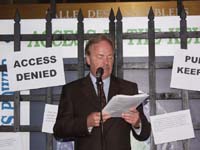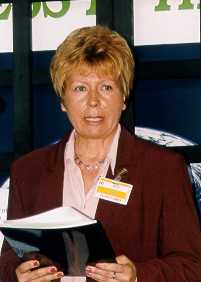OPENING THE DOORS TO DEMOCRACY
On 30 October 2001, a celebration of the entry into force of the Aarhus Convention took place in the Palais des Nations, Geneva.
Representatives of governments, intergovernmental organizations and NGOs took part in the celebrations, which included a champagne cocktail hosted by UNECE. After a number of keynote speeches and a short film on the Convention, a ceremony symbolising the entry into force of the Convention took place. The ceremony involved opening "THE DOORS TO DEMOCRACY" to mark the beginning of a new era in which environmental democracy is recognized in international law. A short film of the celebration will soon be available here. A number of European Environment Ministers, head of important intergovernmental and non-governmental organizations sent a statement in support of the Convention. A compilation of the statements can be downloaded here.
Mr. Kaj Barlund, Director, Environment and Human Settlements Division, opened the celebration. Mr. Barlund delivered the statement of the Secretary-General of the United Nations, Mr. Kofi Annan, in which the Secretary-General described the Convention as the most ambitious venture in environmental democracy undertaken under the auspices of the United Nations.
Following the opening by Mr. Bärlund, a Video News Release - a short film on the Convention - was shown. You can see the film with Real Player.
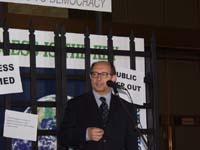
The first keynote speaker was Mr. Bozo Kovacevic, Minister of Environmental Protection and Physical Planning, Croatia.
He said inter alia that "the entry into force of the Aarhus Convention is a historical landmark and an unprecedented example of the international community's successful quest towards more effective protection of the environment."
Full statement
Ambassador Jean-Marie Noirfalisse, Permanent Representative of Belgium to the United Nations, then delivered a statement on behalf of the European Union. He said inter alia: "This day ... marks a beginning, in that the vitality of the exercise of the 3 important legal rights of the Convention will undoubtedly influence political development within the UN-ECE region, beyond the environment sector... In addition, the EU recalls its earlier statements that the Aarhus Convention may attract public attention, beyond the ECE-region, and underlines Art. 19, para 3 of the Convention that also other Members of the United Nations may accede to the Convention..."
Between the keynote addresses, the guests had time to meet and discuss
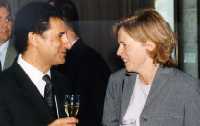
Ambassadors to the United Nations of Denmark, Germany and Belgium
The Chairman of the Meeting of the Signatories to the Convention, Mr. Francesco La Camera (Italy), talking to Sofie H. Flensborg, Aarhus Convention Secretariat.
Ms Anna Golubovska, special adviser to Mr. Serhii Kurykin, Minister of the Environment, Ukraine, spoke on behalf of the Minister who had to cancel his planned trip at the very last minute. She said inter alia "the day that the Aarhus Convention enters into force is a great day for the environment. But it is also a great day for democracy - not just representative democracy, but a new and more participatory form of democracy in which the crucial role of many social actors is recognized."
Full statement
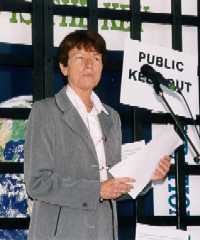
The Deputy Director for the Regional Office of the United Nations Environment Programme, Ms. Francoise Belmont, delivered a statement of behalf of the Executive Director of UNEP, Dr. Klaus T?pfer: "I wish to congratulate the Economic Commission for Europe for the entry into force today of the Aarhus Convention, the first legally binding instrument for access to information, public participation and and justice in environmental matters. Such an achievement is of global significance... Today is an important landmark for the environment. The Convention gives us a golden opportunity to pursue our environmental endeavours from the right approach."
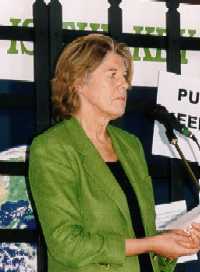
A statement from the United Nations High Commissioner for Human Rights, Ms. Mary Robinson, was delivered by Ms. Stephanie Grant, Chief, Research and Right to Development Branch. She said inter alia: "The Convention is a remarkable achievement not only in terms of protection of the environment, but also of the protection of human rights... The Convention touches on the fundamental issues of democracy and the rights of people to protect their well-being and that of their children."

Considering the central involvement of environmental NGOs in the negotiation process of the Convention and its implementation, the floor was then given to the Secretary-General of the European Environmental Bureau, Mr. John Hontelez, who delivered a statement on behalf of the European ECO Forum. Among other things, he said: "So the UN-ECE work, first on the Sofia Guidelines, later on the Aarhus Convention, was characterized by openness and recognition of the role of environmental organizations in the preparatory process. While we regretted the weaknesses in the final result, we have become strong advocates of the Convention. We campaign for its ratification and accession in the entire pan-European region, as well as in regional and international bodies. We will not be satisfied with formal introduction in national laws only."

 Some special decoration, produced for the occasion - What people are saying about the Aarhus Convention
Some special decoration, produced for the occasion - What people are saying about the Aarhus Convention
Cornelia Quennet-Thielen, Germany, member of the Advisory Board and secretary to the Aarhus Convention, Jeremy Wates
THE DOORS CEREMONY
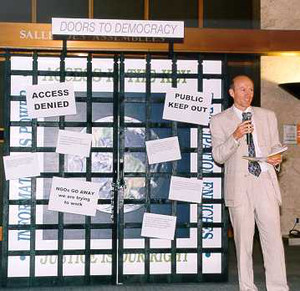
"Because the Convention is about the rights not only of today's but also future generations, we have invited some children to come and open the doors to democracy. I would now like Sarah and Sofie to come forward and open the doors to democracy."
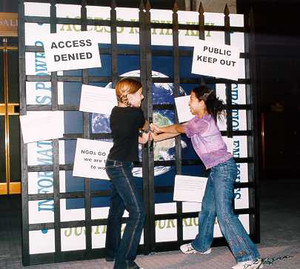
"Excuse me, Mr. Convention Secretary, the doors won't open!"
"Good Heavens! Won't open? What do you mean won't open?"
"They're stuck."
"We paid a lot of money for those doors. Wait till I find the man who made them."
"Can we ask our friends to come and help us?"
"Oh well, if you must. I don't know, it is hard to get a good carpenter these days. OK, Dhanya, Tamsin, Anna, let's see if you can get those doors open."

"We need somebody stronger! Where are Jack and Corin?"
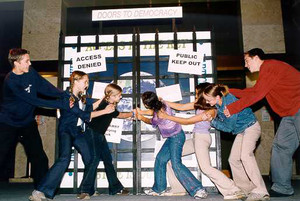
"What is wrong with these doors? Where are Sofie and Subashini? Sofie, I thought you did a trial run with these?"
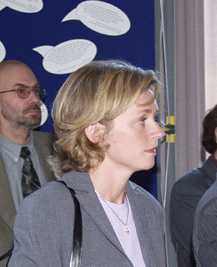
"Well, they worked perfectly well when we did the dress rehearsal. But I think the doors to democracy can only be opened and the Convention properly implemented if governments give it their full support"
"Aah! That could be the explanation. Croatia, Ukraine, Italy, can you help us? We need to get these doors open."

"Well, this is a mystery. Can anyone suggest how we might get these doors open? Perhaps we need the support of the NGOs! John, Svitlana, Fe, come and help us."
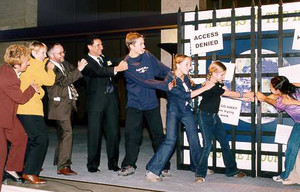
"Well, now that we have the key stakeholders all working together, maybe we can really open the doors to democracy. OK, everybody, one, two, three, PUUULLL!!!"
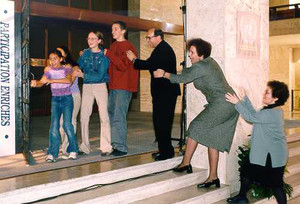
And finally the doors begin to open....

"Thank you everyone for your actively participatory approach. Let it be a symbol of good co-operation between governments and civil society, between young and old, between secretariats and the rest of the world. Of course when we go to Johannesburg, we will need all nine major groups of Agenda 21 to be politically correct but let us cross that bridge when we come to it..."
"I am convinced that future generations will remember what happened on 30 October 2001."
Kjell Larsson, Minister of the Environment, Sweden



